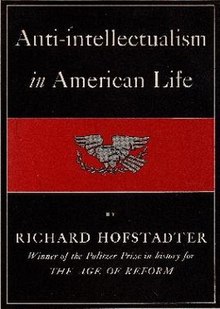Evangelicalism, also called evangelical Christianity or evangelical Protestantism, is a worldwide interdenominational movement within Protestant Christianity that puts primary emphasis on evangelization. The word evangelic comes from the Greek word for 'good news'. The Gospel story of the salvation from sin is considered "the good news". The process of personal conversion involves complete surrender to Jesus Christ. The conversion process is authoritatively guided by the Bible, the God in Christianity's revelation to humanity. Critics of the conceptualization of evangelicalism argue that it is too broad, too diverse, or too ill-defined to be adequately seen as a movement or a single movement.
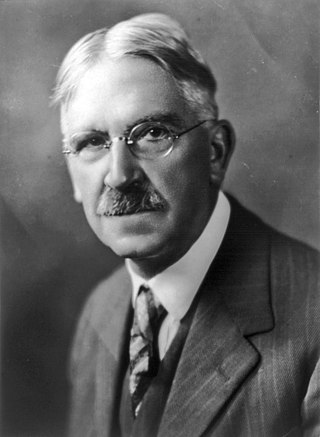
John Dewey was an American philosopher, psychologist, and educational reformer. He was one of the most prominent American scholars in the first half of the twentieth century.
Objectivism is a philosophical system named and developed by Russian-American writer and philosopher Ayn Rand. She described it as "the concept of man as a heroic being, with his own happiness as the moral purpose of his life, with productive achievement as his noblest activity, and reason as his only absolute".
Christian fundamentalism, also known as fundamental Christianity or fundamentalist Christianity, is a religious movement emphasizing biblical literalism. In its modern form, it began in the late 19th and early 20th centuries among British and American Protestants as a reaction to theological liberalism and cultural modernism. Fundamentalists argued that 19th-century modernist theologians had misunderstood or rejected certain doctrines, especially biblical inerrancy, which they considered the fundamentals of the Christian faith.

Richard McKay Rorty was an American philosopher and historian of ideas. Educated at the University of Chicago and Yale University, Rorty's academic career included appointments as the Stuart Professor of Philosophy at Princeton University, the Kenan Professor of Humanities at the University of Virginia, and as a professor of comparative literature at Stanford University. Among his most influential books are Philosophy and the Mirror of Nature (1979), Consequences of Pragmatism (1982), and Contingency, Irony, and Solidarity (1989).
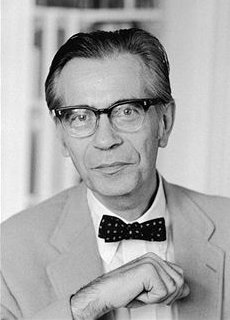
Richard Hofstadter was an American historian and public intellectual of the mid-20th century. Hofstadter was the DeWitt Clinton Professor of American History at Columbia University. Rejecting his earlier historical materialist approach to history, in the 1950s he came closer to the concept of "consensus history", and was epitomized by some of his admirers as the "iconic historian of postwar liberal consensus." Others see in his work an early critique of the one-dimensional society, as Hofstadter was equally critical of socialist and capitalist models of society, and bemoaned the "consensus" within the society as "bounded by the horizons of property and entrepreneurship", criticizing the "hegemonic liberal capitalist culture running throughout the course of American history".
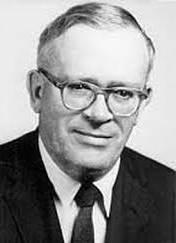
Richard Malcolm Weaver, Jr was an American scholar who taught English at the University of Chicago. He is primarily known as an intellectual historian, political philosopher, and a mid-20th century conservative and as an authority on modern rhetoric. Weaver was briefly a socialist during his youth, a lapsed leftist intellectual, a teacher of composition, a Platonist philosopher, cultural critic, and a theorist of human nature and society.
John Anthony Stormer was an American Protestant anti-communist author, best known for his 1964 book None Dare Call It Treason. Both a pastor and a Christian school superintendent, his books have sold millions, warning America about the communist infiltration of American society, politics and culture. He has been called by the conservative political commentator, Daniel Pipes, "the man who may be the most popular U.S. backstairs author of all time." Richard Hofstadter in The Paranoid Style in American Politics called it a "masterful piece of folkish propaganda."

The Age of Reform is a 1955 Pulitzer Prize-winning book by Richard Hofstadter. It is an American history, which traces events from the Populist Movement of the 1890s through the Progressive Era to the New Deal of the 1930s. The Age of Reform stands out from other historical material because Hofstadter's main purpose for writing is not to retell an extensive history of the three movements, but to analyze the common beliefs of the reform groups in our modern perspective to elucidate historical distortions, most notably between the New Deal and Progressivism.

Robert Christopher Lasch was an American historian, moralist and social critic who was a history professor at the University of Rochester. He sought to use history to demonstrate what he saw as the pervasiveness with which major institutions, public and private, were eroding the competence and independence of families and communities. Lasch strove to create a historically informed social criticism that could teach Americans how to deal with rampant consumerism, proletarianization, and what he famously labeled "the culture of narcissism".
In the United States, conservatism is based on a belief in individualism, traditionalism, republicanism, and limited federal governmental power in relation to U.S. states. Conservatism is one of two major political ideologies in the United States with the other being liberalism. Conservative and Christian media organizations and American conservative figures are influential, and American conservatism is a large and mainstream ideology in the Republican Party and nation. As of 2021, 36 percent of Americans consider themselves conservative, according to polling by Gallup, Inc.
The Merton thesis is an argument about the nature of early experimental science proposed by Robert K. Merton. Similar to Max Weber's famous claim on the link between Protestant work ethic and the capitalist economy, Merton argued for a similar positive correlation between the rise of Protestant Pietism and early experimental science. The Merton thesis has resulted in continuous debates.
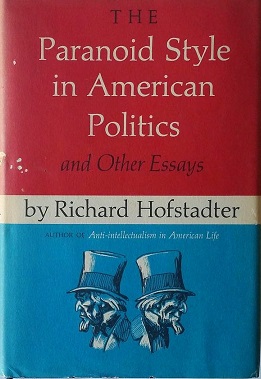
"The Paranoid Style in American Politics" is an essay by American historian Richard Hofstadter, first published in Harper's Magazine in November 1964. It was the title essay in a book by the author the following year. Published soon after Arizona senator Barry Goldwater won the Republican Party presidential nomination over the more moderate Nelson Rockefeller, Hofstadter's article explores the influence of a particular style of conspiracy theory and "movements of suspicious discontent" throughout American history.
John Dury was a Scottish Calvinist minister and an intellectual of the English Civil War period. He made efforts to re-unite the Calvinist and Lutheran wings of Protestantism, hoping to succeed when he moved to Kassel in 1661, but he did not accomplish this. He was also a preacher, pamphleteer, and writer.
Anti-Catholicism in the United States dates back to the colonial history of the U.S. Anti-Catholic attitudes were first brought to the Thirteen Colonies of British North America by Protestant settlers from Europe during the British colonization of the Americas. Two types of anti-Catholic rhetoric existed in colonial society and they continued to exist during the following centuries. The first type, derived from the theological heritage of the Protestant Reformation and the European wars of religion, consisted of the biblical Anti-Christ and the Whore of Babylon variety and it dominated anti-Catholic thought until the late 17th century. The second type was a variety which was partially derived from xenophobic, ethnocentric, nativist, and racist sentiments and distrust of increasing waves of Catholic immigrants, particularly immigrants from Ireland, Italy, Poland, Germany, Austria and Mexico. It usually focused on the pope's control of bishops, priests, and deacons.

Christianity and abortion have a long and complex history. Condemnation of abortion by Christians goes back to the 1st century with texts such as the Didache, the Epistle of Barnabas, and the Apocalypse of Peter. In later years some Christian writers argued that abortion was acceptable under certain circumstances, such as when necessary to save the life of the mother, but these views did not become accepted teachings until some denominations changed their views in the 20th century. The Bible itself does not contain direct references to abortion.

Anti-intellectualism is hostility to and mistrust of intellect, intellectuals, and intellectualism, commonly expressed as deprecation of education and philosophy and the dismissal of art, literature, history, and science as impractical, politically motivated, and even contemptible human pursuits. Anti-intellectuals may present themselves and be perceived as champions of common folk—populists against political and academic elitism—and tend to see educated people as a status class that dominates political discourse and higher education while being detached from the concerns of ordinary people.

Protestantism is a branch of Christianity that emphasizes justification of sinners through faith alone, the teaching that salvation comes by unmerited divine grace, the priesthood of all believers, and the Bible as the sole infallible source of authority for Christian faith and practice. The five solae summarize the basic theological beliefs of mainstream Protestantism.
In the politics of the United States, the radical right is a political preference that leans towards ultraconservatism, white nationalism, white supremacy, or other far-right ideologies in a hierarchical structure which is paired with conspiratorial rhetoric alongside traditionalist and reactionary aspirations. The term was first used by social scientists in the 1950s regarding small groups such as the John Birch Society in the United States, and since then it has been applied to similar groups worldwide. The term "radical" was applied to the groups because they sought to make fundamental changes within institutions and remove persons and institutions that threatened their values or economic interests from political life.

Marginal at first, news reports and political analysts have pointed the important weight that the Evangelical Christian community has and its impact in electoral politics in Latin America, even helping in the electoral victories of conservative candidates.
